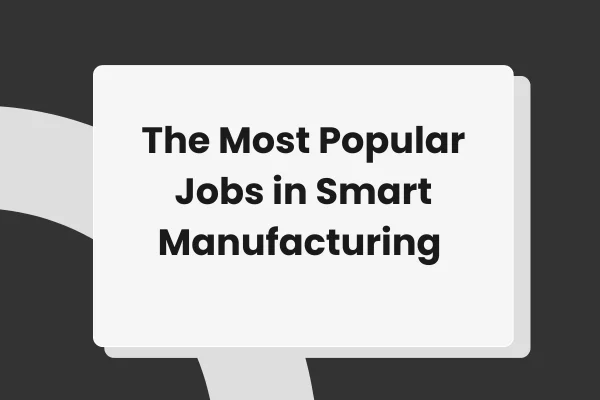
The most in-demand jobs in smart manufacturing today
Smart manufacturing is reshaping the way industrial companies operate. By combining automation, digital systems, and data-driven decision-making, the sector is transforming efficiency and productivity across factories worldwide. This shift has created strong demand for skilled professionals who can design, manage, and optimise the technologies behind Industry 4.0.
For candidates, this means opportunities are opening across a wide range of roles. Employers are looking for individuals who understand the balance between engineering expertise and digital capability. To succeed, professionals need to be aware of which jobs are most in demand and how their skills can align with these career paths.
This article highlights the top roles in smart manufacturing and what makes them so important. It also outlines how candidates can position themselves to benefit from one of the fastest-growing areas in industrial manufacturing.
Smart manufacturing and Industry 4.0
Smart manufacturing represents the integration of digital technologies with traditional industrial processes. Through robotics, connected devices, and advanced data analytics, manufacturers can achieve higher levels of productivity, cost-efficiency, and quality.
The adoption of smart technologies has also changed what businesses look for in employees. Traditional engineering expertise remains vital, but it is increasingly combined with knowledge of data systems, connectivity, and automation. Professionals who can bridge the gap between physical production and digital solutions are particularly sought after.
Mackinnon Bruce works across several areas of industrial manufacturing, including engineered materials, industrial machinery, material handling, and fluid control. These industries are being transformed by smart technologies, and companies in these spaces are seeking talent to keep pace with rapid advancements. For candidates, this means the ability to work at the cutting edge of industrial innovation and contribute directly to shaping the future of manufacturing.
Automation Engineer
Automation is at the heart of smart manufacturing, and automation engineers are central to this shift. They design, implement, and maintain robotic systems and control technologies that drive efficiency on the factory floor. Employers value candidates who can program automated machinery, troubleshoot complex systems, and ensure integration across production lines.
With growing investment in robotics and control technologies, demand for skilled automation engineers continues to rise. Candidates with experience in PLC programming, robotics integration, and mechatronics are in a strong position. This role also offers progression opportunities, as businesses increasingly rely on automation to improve productivity and competitiveness.
Data Analyst and Data Scientist
Smart manufacturing relies heavily on the ability to collect and interpret data. Data analysts and data scientists play a crucial role in translating raw information into actionable insights. Whether improving throughput, forecasting maintenance needs, or identifying quality issues, these professionals are integral to the success of connected factories.
Manufacturers are looking for candidates who can manage large datasets, use advanced analytics tools, and apply statistical modelling to real-world production challenges. Experience with predictive analytics is especially valuable, as it allows companies to reduce downtime and optimise resource allocation. For individuals with strong analytical skills, this role provides opportunities to directly influence operational performance.
Manufacturing Systems Engineer
Manufacturing systems engineers focus on optimising end-to-end processes through the integration of digital tools and systems. Their goal is to ensure that production lines are not only efficient but also capable of adapting quickly to changing requirements.
Candidates in this role need to understand process engineering, digital integration, and systems design. Employers also value professionals who can lead projects to upgrade production capabilities, implement new technologies, and streamline workflows. As smart manufacturing becomes more complex, systems engineers are critical in ensuring seamless operations across different departments and technologies.
Industrial IoT Specialist
Connectivity is a defining feature of smart factories, and industrial IoT specialists are responsible for making it work. These professionals design and maintain networks of sensors, devices, and systems that provide real-time data on performance, quality, and safety.
Employers are seeking candidates with expertise in IoT platforms, connectivity protocols, and data integration. A strong understanding of how to apply IoT solutions to manufacturing challenges is also important. For candidates with backgrounds in networking, embedded systems, or digital infrastructure, this role represents one of the most exciting career paths in industrial technology.
Cybersecurity Specialist for Manufacturing
As manufacturing systems become increasingly connected, they also become more vulnerable to cyber threats. Cybersecurity specialists are essential for protecting critical infrastructure, intellectual property, and operational continuity.
Manufacturers need candidates who can design and implement security frameworks, monitor systems for vulnerabilities, and respond effectively to incidents. Knowledge of industrial control systems, secure network design, and compliance requirements is especially valuable. With the rise of connected factories, cybersecurity roles in manufacturing are expected to grow significantly, making this an important opportunity for candidates with IT security expertise.
Quality and Compliance Engineers
Smart manufacturing still requires rigorous quality standards, and compliance remains critical. Quality and compliance engineers ensure that advanced technologies and automated systems meet regulatory requirements and customer expectations.
Professionals in this role are responsible for designing quality control frameworks, auditing systems, and working with regulatory bodies. Employers are particularly interested in candidates who combine technical expertise with knowledge of compliance frameworks, as this combination ensures both efficiency and safety in manufacturing environments.
Maintenance Technician with Digital Skills
The role of maintenance technician has evolved in smart factories. Beyond mechanical repairs, modern technicians are expected to manage digital monitoring systems and predictive maintenance tools.
Employers are seeking candidates who can work with advanced diagnostic technologies, sensors, and data-driven maintenance strategies. The ability to prevent failures before they occur is highly valued, as it helps manufacturers reduce downtime and protect productivity. For technicians willing to upskill in digital systems, this role offers excellent career progression opportunities.
What this means for candidates
For candidates, the growth of smart manufacturing means opportunities is expanding across a wide range of disciplines. Success comes from building both technical and digital capabilities. Whether through automation training, gaining data analytics expertise, or learning about IoT systems, professionals who invest in their skills are better positioned to secure in-demand roles.
The shift towards Industry 4.0 also creates career paths that offer long-term progression. Companies are seeking adaptable employees who can keep pace with rapid change and contribute to innovation. Candidates who focus on continuous learning and practical application of new technologies will find themselves in strong demand across multiple industries.
How recruitment partners support career moves
Navigating opportunities in smart manufacturing can be challenging without sector-specific knowledge. Recruitment partners provide candidates with insight into market trends, salary expectations, and the skills most valued by employers.
Mackinnon Bruce works across the industrial manufacturing sector, including engineered materials, industrial machinery, fluid control, and smart manufacturing. This gives candidates direct access to opportunities in businesses investing heavily in technology and innovation. By partnering with a recruitment specialist, candidates can identify the best roles for their skills and take steps toward long-term career growth.
Smart manufacturing is driving demand for a new generation of skilled professionals. Automation engineers, data scientists, systems engineers, IoT specialists, cybersecurity experts, compliance professionals, and digital maintenance technicians are among the most sought-after roles. For candidates, this represents a chance to align with industries that are shaping the future of global production.
To understand more about the areas, we recruit in and to view our open opportunities, visit our Industrial Manufacturing page.




